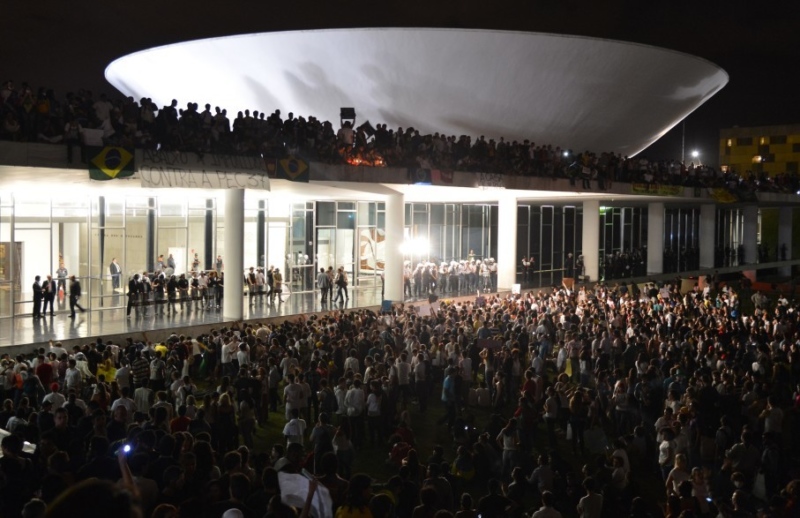A US-Brazil Respect Deficit
Brazil’s rising stature and influence will be on display when President Dilma Rousseff arrives in Washington this week.
By the end of June, over 80 Brazilian cities had experienced massive demonstrations sweeping the country, stemming from acute grievances with dismal public services. The protests, referred to as a “crisis of renewal” by Paolo Sotero, director of the Brazil Institute at the Woodrow Wilson Center, have provoked a political upheaval bent on improving the quality of life for many middle-class Brazilians.
Initial demonstrations on June 6 were sparked by a bus fare hike of 9 cents, which has since been revoked. Since then, the number of the protesters has ballooned, from 2,000 in São Paulo alone during the first demonstration, to over a million across the country by mid-month. Sotero and his fellow panelists agreed that anger over the country’s overall poor infrastructure is a result of a growing modern middle-class, evinced by the fact that a large percentage of the protesters were college educated.
Social unrest in urban areas, accounting for more than 70 percent of Brazil's population, has contributed to political instability. Woefully lacking public services and an unaccountable government have galvanized predominately non-partisan protesters to demand socioeconomic equality. Sotero emphasized that Brazil “will grow with more equity.” Brazil has the highest tax burden in Latin America, constituting approximately 40% of GDP. Providing effective public goods and services will depend on broadening access and quality of healthcare and education, which will require a sustained, long-term commitment by the government. As alluded to by João Augusto de Castro Neves, senior analyst at the Eurasia group, lackluster economic growth will require Brazil to “deliver more with less,” also contingent on thoroughgoing governance reforms. Sotero indicated that prioritizing public spending could go a long way toward advancing democratic accountability and could systematically diminish the number of Brazilians marginalized or excluded from the political process.
Though President Dilma Rousseff has made concessions in an effort to strengthen crisis management, the Brazilian government’s response has not succeeded in reducing public pressure. Raul Juste Lores, Washington correspondent for the Folha de São Paulo, explained that public outcry over corruption in the political system and an overwhelming sense of inadequate political representation have caused many to view Rousseff’s Workers’ Party as lacking legitimacy. Lores also clarified that it remains unclear what will happen next and it’s too soon to rule out a referendum, as proposed by Rousseff that would authorize a constitutional assembly on political reform.
Brazil’s rising stature and influence will be on display when President Dilma Rousseff arrives in Washington this week.
An upcoming meeting between Presidents Obama and Rousseff should not be expected to produce dramatic news or unexpected major breakthroughs.
President Rousseff is arriving in Washington on Monday to meet the US president. Nothing particularly important will happen.
 Valter Campanato / Agência Brasil / CC BY 3.0 BR
Valter Campanato / Agência Brasil / CC BY 3.0 BR